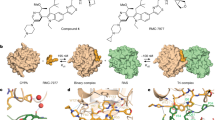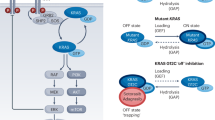Abstract
Despite initial dramatic response, epidermal growth factor receptor (EGFR) mutant lung cancer patients always acquire resistance to EGFR-tyrosine kinase inhibitors (TKIs). Gatekeeper T790M mutation in EGFR is the most prevalent genetic alteration underlying acquired resistance to EGFR-TKI, and EGFR mutant lung cancer cells are reported to be addictive to EGFR/Akt signaling even after acquired T790M mutation. Here, we focused on Akt kinase-interacting protein1 (Aki1), a scaffold protein of PI3K (phosphoinositide 3-kinase)/PDK1 (3-phosphoinositide-dependent protein kinase)/Akt that determines receptor signal selectivity for non-mutated EGFR, and assessed its role in EGFR mutant lung cancer with or without gatekeeper T790M mutation. Cell line-based assays showed that Aki1 constitutively associates with mutant EGFR in lung cancer cells with (H1975) or without (PC-9 and HCC827) T790M gatekeeper mutation. Silencing of Aki1 induced apoptosis of EGFR mutant lung cancer cells. Treatment with Aki1 siRNA dramatically inhibited growth of H1975 cells in a xenograft model. Moreover, silencing of Aki1 further potentiated growth inhibitory effect of new generation EGFR-TKIs against H1975 cells in vitro. Aki1 was frequently expressed in tumor cells of EGFR mutant lung cancer patients (53/56 cases), including those with acquired resistance to EGFR-TKI treatment (7/7 cases). Our data suggest that Aki1 may be a critical mediator of survival signaling from mutant EGFR to Akt, and may therefore be an ideal target for EGFR mutant lung cancer patients, especially those with acquired EGFR-TKI resistance due to EGFR T790M gatekeeper mutation.
This is a preview of subscription content, access via your institution
Access options
Subscribe to this journal
Receive 50 print issues and online access
$259.00 per year
only $5.18 per issue
Buy this article
- Purchase on Springer Link
- Instant access to full article PDF
Prices may be subject to local taxes which are calculated during checkout






Similar content being viewed by others
References
Pao W, Chmielecki J . Rational, biologically based treatment of EGFR-mutant non-small-cell lung cancer. Nat Rev Cancer 2010; 10: 760–774.
Maemondo M, Inoue A, Kobayashi K, Sugawara S, Oizumi S, Isobe H et al. Gefitinib or chemotherapy for non-small-cell lung cancer with mutated EGFR. N Engl J Med 2010; 362: 2380–2388.
Mitsudomi T, Morita S, Yatabe Y, Negoro S, Okamoto I, Tsurutani J et al. Gefitinib versus cisplatin plus docetaxel in patients with non-small-cell lung cancer harbouring mutations of the epidermal growth factor receptor (WJTOG3405): an open label, randomised phase 3 trial. Lancet Oncol 2010; 11: 121–128.
Mitsudomi T, Yatabe Y . Mutations of the epidermal growth factor receptor gene and related genes as determinants of epidermal growth factor receptor tyrosine kinase inhibitors sensitivity in lung cancer. Cancer Sci 2007; 98: 1817–1824.
Gorre ME, Mohammed M, Ellwood K, Hsu N, Paquette R, Rao PN et al. Clinical resistance to STI-571 cancer therapy caused by BCR-ABL gene mutation or amplification. Science 2001; 293: 876–880.
Yauch RL, Dijkgraaf GJ, Alicke B, Januario T, Ahn CP, Holcomb T et al. Smoothened mutation confers resistance to a Hedgehog pathway inhibitor in medulloblastoma. Science 2009; 326: 572–574.
Choi YL, Soda M, Yamashita Y, Ueno T, Takashima J, Nakajima T et al. EML4-ALK mutations in lung cancer that confer resistance to ALK inhibitors. N Engl J Med 2010; 363: 1734–1739.
Kobayashi S, Boggon TJ, Dayaram T, Jänne PA, Kocher O, Meyerson M et al. EGFR mutation and resistance of non-small-cell lung cancer to gefitinib. N Engl J Med 2005; 352: 786–792.
Pao W, Miller VA, Politi KA, Riely GJ, Somwar R, Zakowski MF et al. Acquired resistance of lung adenocarcinomas to gefitinib or erlotinib is associated with a second mutation in the EGFR kinase domain. PLoS Med 2005; 2: e73.
Yun CH, Mengwasser KE, Toms AV, Woo MS, Greulich H, Wong KK et al. The T790M mutation in EGFR kinase causes drug resistance by increasing the affinity for ATP. Proc Natl Acad Sci USA 2008; 105: 2070–2075.
Kwak EL, Sordella R, Bell DW, Godin-Heymann N, Okimoto RA, Brannigan BW et al. Irreversible inhibitors of the EGF receptor may circumvent acquired resistance to gefitinib. Proc Natl Acad Sci USA 2005; 102: 7665–7670.
Kobayashi S, Ji H, Yuza Y, Meyerson M, Wong KK, Tenen DG et al. An alternative inhibitor overcomes resistance caused by a mutation of the epidermal growth factor receptor. Cancer Res 2005; 65: 7096–7101.
Yu Z, Boggon TJ, Kobayashi S, Jin C, Ma PC, Dowlati A et al. Resistance to an irreversible epidermal growth factor receptor (EGFR) inhibitor in EGFR-mutant lung cancer reveals novel treatment strategies. Cancer Res 2007; 67: 10417–10427.
Engelman JA, Zejnullahu K, Gale CM, Lifshits E, Gonzales AJ, Shimamura T et al. PF00299804, an irreversible pan-ERBB inhibitor, is effective in lung cancer models with EGFR and ERBB2 mutations that are resistant to gefitinib. Cancer Res 2007; 67: 11924–11932.
Li D, Ambrogio L, Shimamura T, Kubo S, Takahashi M, Chirieac LR et al. BIBW2992, an irreversible EGFR/HER2 inhibitor highly effective in preclinical lung cancer models. Oncogene 2008; 27: 4702–4711.
Sequist LV, Besse B, Lynch TJ, Miller VA, Wong KK, Gitlitz B et al. Neratinib, an irreversible pan-ErbB receptor tyrosine kinase inhibitor: results of a phase II trial in patients with advanced non-small-cell lung cancer. J Clin Oncol 2010; 28: 3076–3083.
Janjigian YY, Groen HJM, Horn L, Smit EF, Yali Fu FW, Shahidi M et al. Activity and tolerability of afatinib (BIBW 2992) and cetuximab in NSCLC patients with acquired resistance to erlotinib or gefitinib. J Clin Oncol 2011; 29: 7525.
Sordella R, Bell DW, Haber DA, Settleman J . Gefitinib-sensitizing EGFR mutations in lung cancer activate anti-apoptotic pathways. Science 2004; 305: 1163–1167.
Engelman JA, Jänne PA . Mechanisms of acquired resistance to epidermal growth factor receptor tyrosine kinase inhibitors in non-small cell lung cancer. Clin Cancer Res 2008; 14: 2895–2899.
Morrison DK . KSR: a MAPK scaffold of the Ras pathway? J Cell Sci 2001; 114: 1609–1612.
Ishibe S, Joly D, Zhu X, Cantley LG . Phosphorylation-dependent paxillin-ERK association mediates hepatocyte growth factor-stimulated epithelial morphogenesis. Mol Cell 2003; 12: 1275–1285.
Yeung K, Seitz T, Li S, Janosch P, McFerran B, Kaiser C et al. Suppression of Raf-1 kinase activity and MAP kinase signalling by RKIP. Nature 1999; 401: 173–177.
Whitmarsh AJ . The JIP family of MAPK scaffold proteins. Biochem Soc Trans 2006; 34: 828–832.
Kolch W . Coordinating ERK/MAPK signalling through scaffolds and inhibitors. Nat Rev Mol Cell Biol 2005; 6: 827–837.
Nakamura A, Naito M, Tsuruo T, Fujita N . Freud-1/Aki1, a novel PDK1-interacting protein, functions as a scaffold to activate the PDK1/Akt pathway in epidermal growth factor signaling. Mol Cell Biol 2008; 28: 5996–6009.
Mouri A, Sasaki A, Watanabe K, Sogawa C, Kitayama S, Mamiya T et al. MAGE-D1 regulates expression of depression-like behavior through serotonin transporter ubiquitylation. J Neurosci 2012; 32: 4562–4580.
Godin-Heymann N, Bryant I, Rivera MN, Ulkus L, Bell DW, Riese DJ et al. Oncogenic activity of epidermal growth factor receptor kinase mutant alleles is enhanced by the T790M drug resistance mutation. Cancer Res 2007; 67: 7319–7326.
Mulloy R, Ferrand A, Kim Y, Sordella R, Bell DW, Haber DA et al. Epidermal growth factor receptor mutants from human lung cancers exhibit enhanced catalytic activity and increased sensitivity to gefitinib. Cancer Res 2007; 67: 2325–2330.
Yun CH, Boggon TJ, Li Y, Woo MS, Greulich H, Meyerson M et al. Structures of lung cancer-derived EGFR mutants and inhibitor complexes: mechanism of activation and insights into differential inhibitor sensitivity. Cancer Cell 2007; 11: 217–227.
Carey KD, Garton AJ, Romero MS, Kahler J, Thomson S, Ross S et al. Kinetic analysis of epidermal growth factor receptor somatic mutant proteins shows increased sensitivity to the epidermal growth factor receptor tyrosine kinase inhibitor, erlotinib. Cancer Res 2006; 66: 8163–8171.
Clapéron A, Therrien M . KSR and CNK: two scaffolds regulating RAS-mediated RAF activation. Oncogene 2007; 26: 3143–3158.
Dhanasekaran DN, Kashef K, Lee CM, Xu H, Reddy EP . Scaffold proteins of MAP-kinase modules. Oncogene 2007; 26: 3185–3202.
Karp DD, Paz-Ares LG, Novello S, Haluska P, Garland L, Cardenal F et al. Phase II study of the anti-insulin-like growth factor type 1 receptor antibody CP-751,871 in combination with paclitaxel and carboplatin in previously untreated, locally advanced, or metastatic non-small-cell lung cancer. J Clin Oncol 2009; 27: 2516–2522.
Neal JW, Sequist LV . Exciting new targets in lung cancer therapy: ALK, IGF-1 R, HDAC, and Hh. Curr Treat Options Oncol 2010; 11: 36–44.
Zhou W, Ercan D, Chen L, Yun CH, Li D, Capelletti M et al. Novel mutant-selective EGFR kinase inhibitors against EGFR T790M. Nature 2009; 462: 1070–1074.
Yano S, Wang W, Li Q, Matsumoto K, Sakurama H, Nakamura T et al. Hepatocyte growth factor induces gefitinib resistance of lung adenocarcinoma with epidermal growth factor receptor-activating mutations. Cancer Res 2008; 68: 9479–9487.
Yano S, Shinohara H, Herbst RS, Kuniyasu H, Bucana CD, Ellis LM et al. Production of experimental malignant pleural effusions is dependent on invasion of the pleura and expression of vascular endothelial growth factor/vascular permeability factor by human lung cancer cells. Am J Pathol 2000; 157: 1893–1903.
Jackman D, Pao W, Riely GJ, Engelman JA, Kris MG, Jänne PA et al. Clinical definition of acquired resistance to epidermal growth factor receptor tyrosine kinase inhibitors in non-small-cell lung cancer. J Clin Oncol 2010; 28: 357–360.
Acknowledgements
We thank Dr John D Minna (University of Texas Southwestern Medical Center) and Dr Isaiah J Fidler (MD Anderson Cancer Center, Houston, TX, USA) for kindly provided by H1975 and PC14PE6, respectively. We thank Mrs Takayuki Nakagawa and Kenji Kita (Cancer Research Institute, Kanazawa University) for technical assistance and fruitful discussion. This work was supported in part by the Grant-in-Aid for Cancer Research from the Ministry of Health, Labor and Welfare (M Noguchi, 16-1) and was supported by Grants-in-Aid for Cancer Research (T Yamada, 23790902 and S Yano, 21390256) and Scientific Research on Innovative Areas ‘Integrative Research on Cancer Microenvironment Network’ (S Yano, 22112010) from the Ministry of Education, Culture, Sports, Science, and Technology of Japan.
Author information
Authors and Affiliations
Corresponding author
Ethics declarations
Competing interests
Seiji Yano received honoraria from Chugai Pharmaceutical Co., Ltd. and AstraZeneca. Seiji Yano received research funding from Pharmaceutical Co., Ltd., Kyowa Hakko Kirin Co., Ltd. and Eisai Co., Ltd.
Additional information
Supplementary Information accompanies the paper on the Oncogene website
Supplementary information
Rights and permissions
About this article
Cite this article
Yamada, T., Takeuchi, S., Fujita, N. et al. Akt kinase-interacting protein1, a novel therapeutic target for lung cancer with EGFR-activating and gatekeeper mutations. Oncogene 32, 4427–4435 (2013). https://doi.org/10.1038/onc.2012.446
Received:
Revised:
Accepted:
Published:
Issue Date:
DOI: https://doi.org/10.1038/onc.2012.446
Keywords
This article is cited by
-
SUMOylation of AnxA6 facilitates EGFR-PKCα complex formation to suppress epithelial cancer growth
Cell Communication and Signaling (2023)
-
Functional expression of mitochondrial KCa3.1 channels in non-small cell lung cancer cells
Pflügers Archiv - European Journal of Physiology (2022)
-
ANGPTL4 Correlates with NSCLC Progression and Regulates Epithelial-Mesenchymal Transition via ERK Pathway
Lung (2016)



